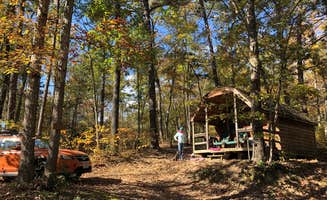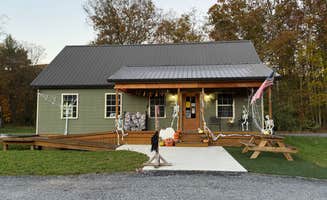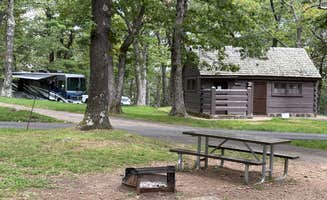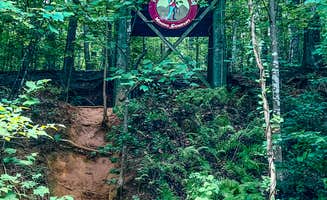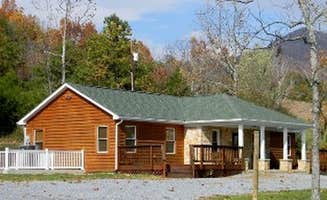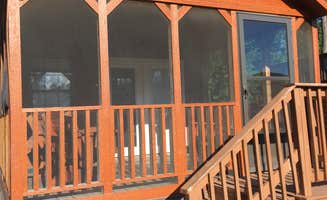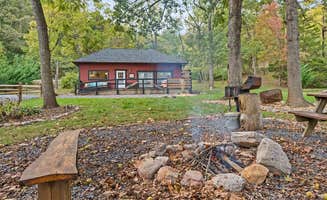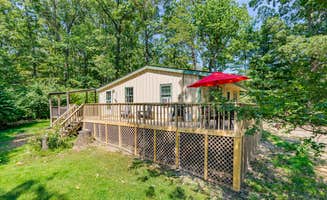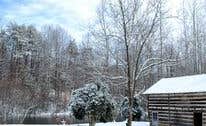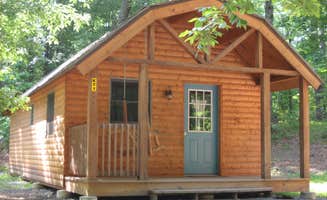Camping cabins near Dayton, Virginia offer year-round access to the Blue Ridge Mountains with elevations ranging from 1,200 to over 3,500 feet. The region experiences four distinct seasons with summer temperatures averaging 75-85°F and winter lows frequently dropping below freezing. Most cabin facilities remain open through winter months, though amenities may be limited during colder seasons.
What to do
Hiking trail access: At Lewis Mountain Campground, campers can access trails directly from their sites. "It's in middle of everything. Great hikes nearby including waterfalls and rock scrambles," notes Anne K. The campground connects directly to the Appalachian Trail, allowing for day hikes without driving.
Mountain biking: Stokesville Campground offers extensive trail access for cyclists. "Four miles of flow mountain bike trails inside the campground with endless miles of trails just outside. Stokesville is a mountain bike destination that cyclists travel from all around," according to James. The campground serves as a gateway to George Washington National Forest trails.
Fishing opportunities: Several campgrounds maintain stocked fishing ponds for guests. At Shenandoah Valley Campground, "decent fishing in the pond" is available according to Jerry G., while the nearby Middle River provides additional fishing access. Most campgrounds do not require Virginia fishing licenses for on-property ponds.
What campers like
Wildlife viewing: Big Meadows Campground provides regular wildlife encounters. "We saw many deer and bear while camping. Just being in Shenandoah is a soothing experience," shares Rachel M. Another camper adds, "You will definitely see deer in the campground as they walk through and browse the understory. They are unafraid of humans unless directly approached."
Camp stores: Loft Mountain Campground offers a well-supplied store for campers who forget essentials. "There is also a very nice and well stocked campstore. They had everything you need," notes Katrin M. The store stocks typical camping supplies, snacks, and limited grocery items during peak season.
River access: Many cabins feature direct river access for swimming and recreation. "The river, the views, the experience. It's all good probably best time I ever had," says Susan P. about her stay at Shenandoah River State Park. Several campgrounds offer tube rentals for floating the Shenandoah during summer months when water levels are sufficient.
What you should know
Cell service limitations: Coverage varies significantly throughout the region. "Cell signal and camp wifi are bad. I was just able to get a decent signal with Starlink by carefully pointing at a small gap between trees," reports Dale Y. at Harrisonburg-Shenandoah Valley KOA. Most campgrounds have limited or no wifi, so download maps in advance.
Shower availability: Shower facilities vary between locations. At Loft Mountain, "The shower was about 0.3 miles away. They charge $5 for 10 min, which you have to pay in quarters." Many primitive sites lack showers entirely, while others offer coin-operated facilities. Call ahead to confirm current pricing and operation hours.
Weather preparedness: Mountain elevations can create significant temperature fluctuations. "It was an especially cold night hitting a low of 14F. Very happy for the nearby heated restrooms with hot running water," writes Carol B. about winter camping. Even summer nights can drop below 50°F at higher elevations.
Tips for camping with families
Kids' activities: Yogi Bear's Jellystone Park Luray specializes in family entertainment. "The kids loved running off in the open field and playing on the zip line. We loved that we could see them from our site. The birthday boy also loved the outdoor laser tag!" shares Jen O. Activities typically include scheduled programs from Memorial Day through Labor Day.
First-timer friendly: Some locations cater specifically to beginner campers. "One of my favorite campgrounds - particularly when I bring first time campers. Clean grounds and importantly clean facilities," notes Laura N. Sites with electric hookups, water access, and clean bathrooms reduce stress for families new to camping.
Insect preparation: Bug activity can intensify during summer months. "The bugs when we got here were kinda crazy. They don't bite but they swarm your head and try to enter every orifice for some reason. A head net was helpful to get the tent and screen room set up," advises Veronica S. Peak insect activity typically occurs between June and August.
Tips from RVers
Leveling challenges: Some campgrounds present difficulties for larger vehicles. "Our site (52) was tiny so it was a tad stressful having kids running around right beside the road," reports Chaz M. from Misty Mountain Camp Resort. Another camper notes, "Our only real drawback was our site was not even close to level. It probably shouldn't have been available for a 40'+ RV."
Extended stay accommodations: Several campgrounds accommodate longer visits. "We spent 2 weeks at SVC while our trunk was in the shop. Everyone on staff was accommodating, helpful and friendly," writes Gabe about Shenandoah Valley Campground. Monthly rates typically offer significant discounts compared to nightly fees during off-peak seasons.
Seasonal considerations: Winter camping options exist but with limitations. "We camped here the last night of the season (Nov30) and shared the campground with a mix of tent campers, car/van campers, and a few larger units," notes Carol B. Most campground water systems shut down when temperatures consistently drop below freezing.


